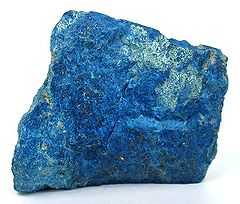Shattuckite
| Shattuckite | |
|---|---|
 Shattuckite from the type locality in Bisbee. Size: 6.0×4.9×2.9 cm. | |
| General | |
| Category | Inosilicate |
| Formula (repeating unit) | Cu5(SiO3)4(OH)2 |
| Strunz classification | 09.DB.40 |
| Identification | |
| Color | Dark and light blue, turquoise |
| Crystal habit | Commonly spherulitic aggregates of acicular crystals |
| Crystal system | Orthorhombic |
| Cleavage | perfect along [010] and [100] |
| Fracture | uneven |
| Mohs scale hardness | 3.5 |
| Luster | Dull to silky |
| Streak | Blue |
| Diaphaneity | Translucent to opaque |
| Specific gravity | 4.1 (rather heavy for a non-metallic mineral) |
| Optical properties | Biaxial (+) |
| Refractive index | nα = 1.753, nβ = 1.782, nγ = 1.815 |
| Pleochroism | X = very pale blue; Y = pale blue; Z = deep blue |
| References | [1][2][3] |
Shattuckite is a copper silicate hydroxide mineral with formula Cu5(SiO3)4(OH)2. It crystallizes in the orthorhombic – dipyramidal crystal system and usually occurs in a granular massive form and also as fibrous acicular crystals. It is closely allied to plancheite in structure and appearance.
Shattuckite is a relatively rare copper silicate mineral. It was first discovered in 1915 in the copper mines of Bisbee, Arizona, specifically the Shattuck Mine (hence the name). It is a secondary mineral that forms from the alteration of other secondary minerals. At the Shattuck Mine, it forms pseudomorphs after malachite. A pseudomorph is an atom by atom replacement of a crystal structure by another crystal structure, but with little alteration of the outward shape of the original crystal.
Gallery
-

Shattuckite with malachite, about 4 cm wide. Kaokoveld Mine, Namibia
-

Polished shattuckite with malachite, New Cornelia mine, Ajo, Arizona. Size 5.3×5.1×5.0 cm
References
| Wikimedia Commons has media related to Shattuckite. |
- ↑ Shattuckite. Webmineral.com. Retrieved on 2011-10-10.
- ↑ Shattuckite. Mindat.org (2011-09-08). Retrieved on 2011-10-10.
- ↑ Shattuckite. Handbook of Mineralogy. (PDF) . Retrieved on 2011-10-10.